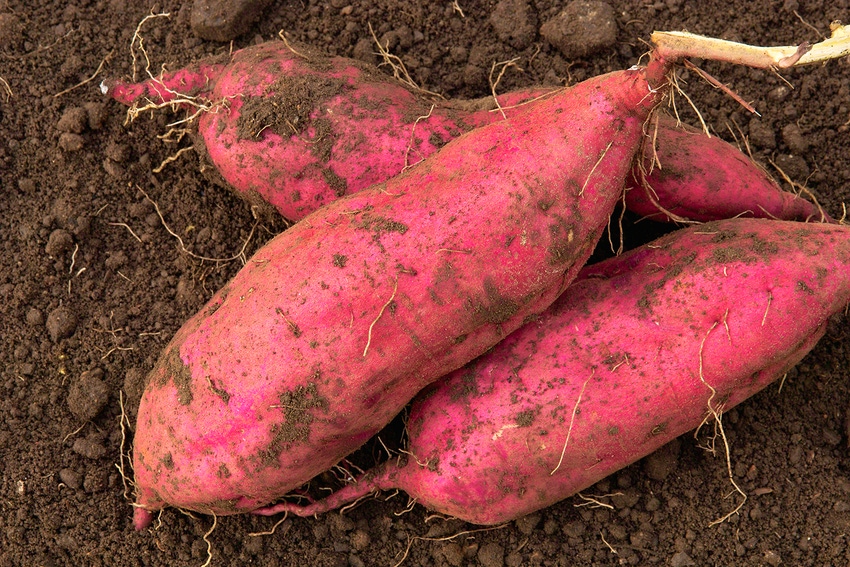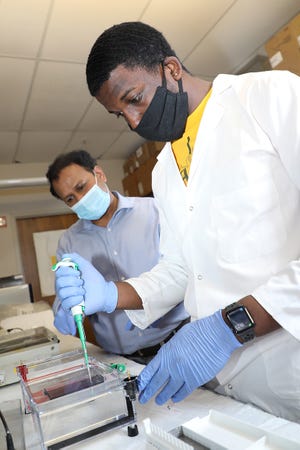May 3, 2021

The U.S. Department of Agriculture (USDA) National Clean Plant Network governing board recently awarded a grant of over $68,000 to the University of Arkansas at Pine Bluff (UAPB), Dr. Obadiah Njue, Extension administrator/assistant dean for Extension and outreach for the UAPB School of Agriculture, Fisheries and Human Sciences, said.
The award will provide support for the university’s Sweetpotato Foundation Seed Program efforts to conduct research and outreach for the sweet potato industry.
“The grant will go a long way in ensuring UAPB continues to greatly contribute to the sweet potato industry both in Arkansas and nationwide,” he said. “UAPB’s Sweetpotato Foundation Seed Program supplies high-quality, virus-indexed planting materials to farmers. It is responsible for approximately 90% of the acreage under sweet potato production in Arkansas.”
Clean plant network
UAPB is one of six universities that make up the National Clean Plant Network for sweet potatoes. Supported by the USDA, the organization promotes the use of pathogen-tested, healthy planting materials for food crops in the U.S. UAPB’s program includes a state-of-the-art biotechnology lab that allows researchers to develop and multiply virus-indexed sweet potato slips (planting materials) for use in the production of high-quality sweet potato seed stock.
 Dr. Sathish Kumar Ponniah, left, and Myles Morton, right, conduct research in UAPB’s biotechnology lab. (Univeristy of Arkansas Pine Bluff)
Dr. Sathish Kumar Ponniah, left, and Myles Morton, right, conduct research in UAPB’s biotechnology lab. (Univeristy of Arkansas Pine Bluff)
Dr. Sathish Kumar Ponniah, a UAPB Extension specialist who works with the foundation seed program, said sweet potatoes are propagated by stem cuttings, which makes the crop more susceptible to virus accumulation over time. More than 30 viruses are known to affect sweet potatoes. The use of virus-infected slips for subsequent seasons can have a profoundly negative effect, decreasing the yield potential and profitability of a farmer’s operation.
“Viral diseases in sweet potatoes commonly reduce yield by as much as 40%,” he said. “They also reduce quality in several ways, including by causing russet crack symptoms in the storage roots.”
Dr. Ponniah said sweet potato production in Arkansas has been growing steadily, with a 66% increase in production from 3,000 acres to 5,000 acres between 2012 and 2018. The crop is mostly cultivated in the Mississippi Delta region of the state. Increased acreage and market demand for sweet potatoes and products made from the crop have continued to increase the need for high quality, virus-indexed planting material in Arkansas.
Building demand
“UAPB’s goal is to help meet this demand to support producers,” he said. “Although program activities in 2020 were scaled back due to the pandemic, funding from the state and the National Clean Plant Network for sweet potatoes helped propagate 2,024 tissue culture plants, which were used to produce 40,000 slips for the season. UAPB worked with 25 growers from Arkansas, supplying them virus-indexed sweet potato slips and technical assistance.”
Specifically, the USDA grant will fund the participation of a UAPB graduate student on the project, Dr. Ponniah said. Myles Morton, a graduate student of the UAPB regulatory science program, supports the project through related thesis research work.
“Mr. Morton will learn how to develop virus-indexed sweet potato plants through tissue culture and screen the plants using advanced molecular biology techniques,” he said. “He will also study the reinfection rate of viruses in sweet potato planting materials over multiple generations of production.”
Conducting research with the Sweetpotato Foundation Seed Program is a way for both undergraduate and graduate students at UAPB to gain invaluable laboratory experience while working on a timely project of great importance to the economy of Arkansas, Dr. Ponniah said.
“It is a point of pride that of the six universities that make up the National Clean Plant Network for sweet potatoes, UAPB is the only 1890 land-grant university involved.”
The University of Arkansas at Pine Bluff offers all its Extension and Research programs and services without regard to race, color, sex, gender identity, sexual orientation, national origin, religion, age, disability, marital or veteran status, genetic information, or any other legally protected status, and is an Affirmative Action/Equal Opportunity Employer.
Source: University of Arkansas at Pine Bluff School of Agriculture, Fisheries and Human Sciences, which is solely responsible for the information provided and is wholly owned by the source. Informa Business Media and all its subsidiaries are not responsible for any of the content contained in this information asset.
You May Also Like




